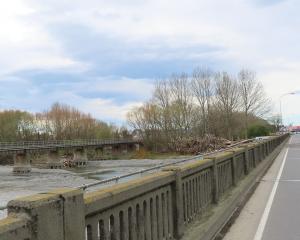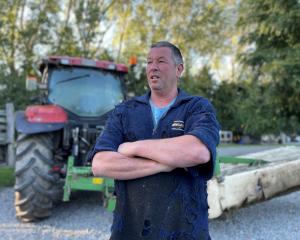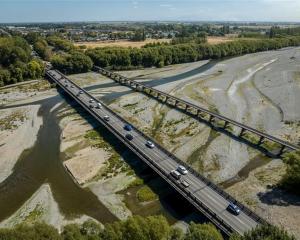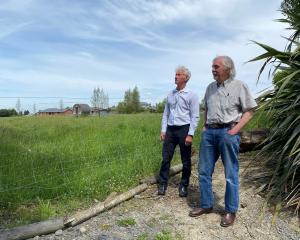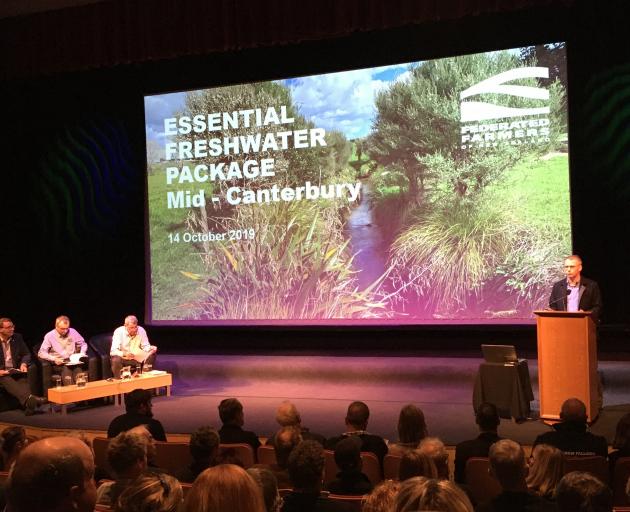
It was an analogy Mr Forrest used at a public meeting at the Ashburton Trust Event Centre in Ashburton to describe the Government's 115-page essential freshwater proposal.
The meeting, led by Federated Farmers Mid Canterbury provincial president David Clark, drew almost 500 people: the majority farmers, including those from Culverden, Leeston and Waimate but there were also industry representatives, rural and urban business owners, new and outgoing district and regional councillors and members of the community.
Mr Forrest was on the information panel along with Mid Canterbury farmer, and Federated Farmer board member, environment and water spokesman Chris Allen and North Island regional policy manager Dr Paul Le Mierre. Federated Farmers chief executive officer Terry Copeland also spoke.
"It's not just a discussion document,'' Mr Forrest said.
It included three critically important, and advanced, regulatory documents which has alarmed Federated Farmers; a draft national policy statement for Freshwater Management, a proposed National Environmental Standard for Freshwater and Draft Stock Exclusion Section 360 Regulations.
There is also concern over the lack of cost benefit analysis, the short six-week timeframe calling for submissions on the proposal (extended by two weeks after pushback), four other significant submissions also happening at the same time and there will be no hearings for the proposal, with cabinet, not Parliament, to make the final decision.
The panel went through the proposals and their concerns as well as answering questions from the crowd.
The event was also live-streamed.
Mr Clark reiterated Federated Farmers concerns the proposal, as it was written, would affect business owners and employers in communities such as Mid Canterbury as much as it will hurt farmers.
He said trusting those in power was not an option.
This proposal, which closes on October 31 at 5pm, was the one and only chance for the voice of farmers, and those in the community, to be heard. There was no second round or recourse.
It was in the farmer interest to look after and care for their land and most farmers in Canterbury were already involved with the existing Canterbury Land and Water Plan, something they were fully engaged with to improve water quality, Mr Clark said.
A blanket nationwide rule was not the answer and would see "unintended consequences'' occur - loss of jobs, bankruptcy or production losses.
Mr Copeland said Federated Farmers represented the long-term ability of landowners to profitably and sustainably produce food and fibre, regardless the type of productive land use.
"It's up to you what you do with your land,'' he said, but under the proposal the flexibility for farmers to choose how to farm their land will no longer exist, without permissions.
"We want to support communities so they are vibrant.''
Mr Copeland said the primary sector was an important driver for local and regional economies as well as the national economy.
It accounts for more than $46billion of exports; dairy $18.12b, meat and wool $10.17b and arable $236m which provides a domestic food source for people and animals, particularly in Canterbury.
"Farmers and growers rely on service industries to produce high quality and high value products and to transport, process and market them to discerning customers in international markets.''
With a current GDP of 11 per cent, it was more likely 15 per cent when support industries such as the diesel mechanic who relied solely on farming machinery, and other support industries, were taken into account.
"What is going to replace this income and how can we keep our communities vibrant?
"It's not fully thought through,'' he said of the proposal.
Mr Clark said facilities such as the event centre and Lake Hood exemplified the economical transformation that happened in the district as a result of the districts farmers flexible land use, and their ability to react to markets, post 1990s.
There was a thriving and diverse economy with full schools and low unemployment.
Member of Parliament for Rangitata Andrew Falloon, who was also at the meeting, said if farmers had been involved during the process "alarm bells wouldn't be ringing now, there are major flaws and unintended consequences contained in (minister David Parker's) proposals.''
"The impact isn't just on our rural communities, it's every business in town that counts farmers as customers and the knock-on effect throughout the local economy.''
"The lack of economic modelling released by the Government shows that they're not interested in having a meaningful debate,'' he said.
Farmers putting in submissions on the essential freshwater proposal should use their own words and speak about their farm.



